|
A few years ago, I was backpacking through the desert of northeastern New Mexico. On one particular day, we were going to climb the tallest mountain of our trek, Baldy Mountain, at an elevation of 12,441 feet. As we got higher, the climb became more difficult with thinning air and more challenging terrain. As we neared the summit, I ended up in front of the crew. Just as we reached the summit, our crew leader, Jordan, literally gave me the final push to the top. At that moment, we were on top of the world and gleaming with joy! While on the mountaintop, we could see for miles. As we reveled, I paused and said a quick prayer of thanksgiving. One couldn't help but be amazed at God's great creation. As we rested, having a quick snack and some water, we saw some storm clouds starting to roll in and were forced to descend quicker than anticipated. Eventually, we would finish our 110 mile trek—with Baldy Mountain being one of the greatest highlights.
Whenever I hear the story of the Transfiguration, my mind immediately goes to this time in the mountains. Because of this experience, I feel as though I have walked with Peter, John, and James. At the moment I reached summit, I caught a glimpse of the glory of God. I saw a small part of the transfiguring power of Jesus. I went from a hiker to a pilgrim in a matter of seconds. My trek now had a greater significance. It was no longer just a physical challenge, but one that would cause me to go on a religious quest in God's great creation. This is what I see in last Sunday's Gospel, which is a reminder of the splendor of Jesus. Usually by this point in Lent, I am more concerned about avoiding the things I have given up and less on Jesus. The Transfiguration is a reminder of why we enter the Lenten season: to see the face of Jesus. He helps us transfigure ourselves into being more loving, more merciful, and more perfect humans. If we look at the beginning of Chapter 9 of Luke, Jesus gives his mission to the Apostles. He tells them to go out and proclaim the Good News. It is after the Transfiguration that he reveals more of his glory. We, too, have the same experience. These experiences come in a number of different ways. They are often brief personal moments that can happen anywhere. Personally, I often find them in interactions with individuals. It can be serving the poor, being with a friend during a difficult time, or smiling at a stranger in the grocery store. From the moment of our baptism, we are sent out into the world as apostles and then along the way we consistently experience his glory. This encounter can happen anywhere and at anytime. I also appreciate Peter's role in this Gospel. Rather than being amazed at the splendor of Christ and the conversation between him, Elijah, and Moses, Peter suggests they pitch tents for the three. Doing so would completely defeat the purpose of the meeting. His transfiguration is an affirmation of his identity as the Messiah and is meant to show how Jesus is the fulfillment of the Old Testament. I often find that I say something at the wrong place or time. That is exactly what Peter does here. He means well, but doesn't see what is in front of him: the glory that Jesus has revealed. In his humanity, Peter often does this, yet Jesus still loves him. Especially during the Year of Mercy, we need to be reminded that we, too, can be like Peter and that is okay. We often don't see the splendor in front of our eyes. But we know that we are loved by God, who is the Infinite Love. When we invite God to enter our hearts, we can see the spender of God. Like the patron of the Catholic Apostolate Center, St. Vincent Pallotti, said "Seek God and you find God. Seek God in all things and you will find God in all things. Seek God in always and you will always find God." As we go on this week, we should be looking in our own lives to see the transfiguring power of Christ. It may not be a major event, like last Sunday's Gospel, but in the small things. If we keep our hearts open this Lent we will find God anywhere. For more resources to accompany you on your Lenten journey, click here.
0 Comments
‘We are unworthy servants; we have only done what was our duty.’” -Luke 17:10
The passage above, taken from Tuesday’s Gospel, describes the humble response Christ tells us to have in fulfilling our responsibilities. Even when God calls us to do extraordinary things, we should seek no praise for them. This kind of humility is exemplified by Pope Francis, whose papacy has had a deep humility as one of its defining characteristics. When reflecting on the moment of his election as the Successor to Saint Peter, Pope Francis said, “This is me, a sinner on whom the Lord has turned his gaze … but I trust in the infinite mercy and patience of our Lord Jesus Christ, and I accept in a spirit of penance.” Most of us will never be given such a place of honor, but it is in the small every day experiences that we can show our humility and be an instrument of Gods graces. One example of someone showing humility comes from my brother, a midshipmen (student) at the U.S. Naval Academy. I feel that any person who offers up even a portion of their life to serve in the military and help make our freedoms possible should be respected and thanked. One way in which airline companies show their appreciation for the services provided by the military is to allow uniformed members of the military to board planes early. Though getting on an airplane a few minutes early may seem like something trivial, many of us go out of our way to try to get a good place while boarding a plane so that we may get a better seat or more overhead storage space. The U.S. Naval Academy requires all of its midshipmen to travel in uniform. Once while traveling home with my brother, the crew announced that any uniformed members of the military could board early. I looked at my brother, expecting him to board, but he didn’t. The women making the announcements had noticed him in the terminal and made the announcement again, but he still just sat there. As the women moved on, I asked my brother why he didn’t board when he had the opportunity to. He said something to the effect of not having earned any special treatment. Regardless of his service record, I don’t think my brother would take up the airline’s offer. My brother could have gotten a great seat, but he quietly turned down the offer. Service in the military for my brother is a duty. I think it’s an extraordinary responsibility worthy of many thanks. That is what makes the humility shown by so many of the members of the military such a powerful witness to me. If men and women who are willing to risk their lives can demonstrate such humility, how much more could I demonstrate in my own daily tasks? Let us pray for members of the military and thank them in whatever way we can for their service, and take to heart the example that those like my brother and others in our lives give us in doing the ordinary things God has called them to do with humility. Patrick Burke is a staff member at The Catholic University of America in Washington, D.C. 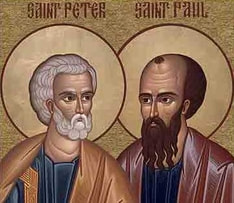 Yesterday, we celebrated the Solemnity of Sts. Peter and Paul, which gives the faithful the opportunity to reflect on many different subjects. For instance, it is on this feast that the Pope traditionally presents the pallium to newly installed metropolitan archbishops, signifying their union with the Holy See. The feast is also important for the ecumenical movement because it is on this day that leaders of both the Catholic and Orthodox churches come together to pray and work towards full communion. However, one theme that seems to be missed is that of God’s mercy as exemplified by the lives of these two leaders of the early Church. And with the Jubilee Year of Mercy upcoming, one might want to look to these great saints for some inspiration. One of the most well-known moments of the Passion is when Peter denies Christ three times (Mt 26:69-75) even after promising Jesus that, “though all should have their faith shaken, mine will not be” (Mk 14:29). Likewise, Paul also denied Jesus by his persecution of the disciples. He even takes part in the death of the first martyr, St. Stephen (Acts 7:58-60). If their stories had stopped there, we might judge the first as a fare-weather follower and the second as a ruthless fanatic. Yet, we know that is not how the story ends. In the Gospel of John, Jesus appears to his disciples as they are fishing. They are eating breakfast on the shore when Christ asks Peter three times, “Do you love me?” to which Peter replies yes twice and at the third time says, “Lord, you know everything, you know that I love you” (Jn 21:15-17). And thus, Peter is redeemed and given the charged by Jesus to “Feed my sheep.” He becomes the leader of the early church and by tradition is regarded as the first pope. On his way to Damascus, Paul sees a bright light from the sky and voice crying out, “Saul, Saul, why are you persecuting me?” (Acts 9:4). The voice is revealed to be that of Jesus himself. Blinded by the light, Paul enters Damascus when one of Jesus’ disciples, Ananias, lays his hands on him at the Lord’s command. Upon doing so, Paul’s vision is regained, is baptized, and goes on to preach the Gospel throughout the Mediterranean. Pope Benedict XVI reminds us that, “The Church is not holy by herself; in fact, she is made up of sinners…Rather, she is made holy ever anew by the Holy One of God, by the purifying love of Christ.” Similarly, Pope Francis recalls, “[God] never tires of forgiving, but at times we get tired of asking for forgiveness…He is the loving Father who always pardons, who has that heart of mercy for us all.” The lives of Sts. Peter and Paul show us that no one is beyond forgiveness, so long as he or she seeks the mercy of God. Therefore, these two great pillars of the Church are a great reminder to have as we approach the Jubilee Year. Victor David is a staff member at The Catholic University of America in Washington, D.C.
A few weeks ago, the Vatican announced the canonization date of two soon-to-be saints. Blessed Pope John XXIII and Blessed Pope John Paul II will be declared saints on April 27, 2014 and will join the ranks of thousands of holy men and women who have been declared similarly. As Catholics, we have a great devotion to the saints. And with good reason: saints are good models for us in our faith. According to the Catechism of the Catholic Church, “By canonizing some of the faithful, i.e., by solemnly claiming that they have practiced heroic virtue and lived in fidelity to God’s grace, the Church recognizes the power of the Spirit of holiness within her and sustains the hope of believers by proposing the saints to them as models and intercessors” (CCC 828). But why do we have a great devotion to the saints? What is it about these holy men and women that inspires and challenges us to live out our faith in God? From Saints Aaron and Abadios to Saints Zoticus and Zygmunt Gorazdowski, we feel a sense of connection to these men and women because, in many ways, they were a lot like us; regular people following Christ’s example in their lives. Whether they lived a thousand years ago or died just last decade, these holy men and women help us to fashion our lives so we can become better human beings and better disciples of Christ, and strive to become saints ourselves. Blessed John Paul II himself has said: “The Saints have always been the source and origin of renewal in the most difficult moments in the Church’s history.” Who wouldn’t want to follow the way of those men and women? Who are the saints that mean most to you? What saints have you sought out when you have needed to pray for help or in thanksgiving? For me, as I’ve written about before, I personally have developed an affinity for St. Monica, my patron saint. Over the years, though, I have often prayed to Saints Peter and Paul, whose feast day is the day after my birthday, as well as to St. Therese of Lisieux, Venerable Catherine McAuley, St. Ignatius of Loyola, and St. Vincent Pallotti – all patrons of schools I have attended or organizations where I have worked. I have learned about each of these saints and have appreciated the role they have in the Church, both on a larger scale and for me personally. Have you been struggling to find some inspiration in your daily prayer life? Do you want to find out more about saints that you may feel a connection to? Take a look at the Catholic Apostolate Center’s website for resources on Prayer and Catechesis, which includes information about the saints. Monica Thom Konschnik is the Administration & Finance Manager for the Catholic Apostolate Center.
“Do not worry about how or what you are to speak in your defense, or what you are to say; for the Holy Spirit will teach you in that very hour what you ought to say.” - Luke 12:11-12
“Moses, however, said to the LORD, ‘If you please, LORD, I have never been eloquent, neither in the past, nor recently, nor now that you have spoken to your servant; but I am slow of speech and tongue.’ The LORD said to him, ‘Who gives one man speech and makes another deaf and dumb? Or who gives sight to one and makes another blind? Is it not I, the LORD? Go, then! It is I who will assist you in speaking and will teach you what you are to say.’" - Exodus 4:10-12 I wouldn’t necessarily go so far as to characterize myself “slow of speech and tongue” as Moses does, but I do face certain insecurities when it comes to speaking out (about the faith or any topic). I am a perfectionist. I often hold back from evangelizing out of fear that I will say the wrong thing, or even the right thing but not do it justice. This fear is the reason I prefer writing; I can revise until the text says (almost) precisely what I want. However, I am finding more and more that I am being thrown into situations which do not have space for revision. How can I be sure to respond in a way worthy of my baptismal call? When we volunteered together on a recent Confirmation retreat, my friend gave an eloquent reflection on the person of the Holy Spirit as a gift and an advocate to us and for us. The gifts of the Holy Spirit - including those which precede eloquent speech, such as knowledge and understanding - are truly the gift of the Holy Spirit, the person of the Trinity. We are given God, whom we can call to our side to provide us with whatever strength we currently need... even when we’re unsure what we truly need. St. Paul points out that “we do not know how to pray as we ought, but the Spirit itself intercedes with inexpressible groanings” (Romans 8:26). My friend, who is a high school teacher, found that on the days when he remembered to pray to the Holy Spirit before class, the class had the most fruitful discussions. University of Notre Dame President Emeritus and civil rights champion Rev. Theodore Hesburgh, CSC, repeats the simple prayer “Come, Holy Spirit” hundreds of times throughout the day, in immediate preparation for every situation. If that prayer is good enough for him, it’s good enough for me. While comforting, the Spirit's guidance does not excuse us from all responsibility in developing the coherent response of the Church to the world. St. Peter reminds the faithful that we must "always be ready to give an explanation to anyone who asks you for a reason for your hope" (1 Peter 3:15). Even with the Holy Spirit as our advocate, preparation is necessary. I must be disciplined and conscientious in my study for my upcoming comprehensive examinations. I must continue to grow in prayer, as well as increase my knowledge of my faith and I must be aware of my witness to the faith in word and deed with each person I encounter Yet once the critical moment of speech or witness arrives, just breathe a call to the Holy Spirit and take God’s own Word for it: Do not worry about what you are to say (Lk 12:11). Come, Holy Spirit, fill the hearts of your faithful. Enkindle in us the fire of your love. Send forth your Spirit, and we shall be created, and You shall renew the face of the earth. Laura Berlage holds a M.A. in theology from the University of Notre Dame and currently works as a Pastoral Associate in the Archdiocese of St. Louis, MO. Today marks the 8th anniversary of Bl. John Paul II death. He was a man who proclaimed Christ triumphant victory over death with great zeal. This day, as we pray for his intercession, let us mediate on his words on the Risen Christ that he shared on Easter Sunday, April 23, 2000.
'O death, where is your sting?' (1 Cor 15:55) "Mors et vita duello conflixere mirando . . ." "Death and life have contended in that stupendous combat: The Prince of life, who died, reigns immortal" (Easter Sequence). Once again, today, the whole Church pauses in amazement at the empty tomb. Like Mary Magdalen and the other women, who came to anoint with spices the body of the Crucified One, like the Apostles Peter and John who came running at the word of the women, the Church bows before the tomb in which her Lord was placed after the crucifixion. A month ago, as a pilgrim in the Holy Land, I had the grace of kneeling before the stone slab which marks the place of Jesus' burial. Today, Easter Sunday, I make my own the proclamation of the heavenly messenger: "He is risen, he is not here" (Mk 16:6). Yes, life and death were locked in combat and Life was victorious for ever. All is once again oriented to life, to Eternal Life! "Victimae paschali laudes immolent christiani . . ." "Christians, to the Paschal Victim offer sacrifice and praise. The sheep are ransomed by the Lamb; and Christ, the undefiled, has sinners to his Father reconciled". The words of the Easter Sequence marvellously express the mystery accomplished in Christ's Passover. They point to the power of renewal flowing from his Resurrection. With the weapons of love, God has defeated sin and death. The Eternal Son, who emptied himself to become the obedient servant to the point of dying on the Cross (cf. Phil 2:7-8), has conquered evil at its roots by opening to contrite hearts the path of return to the Father. He is the Gate of Life who at Easter overcomes the gates of hell. He is the Door of salvation, opened wide for all, the Door of divine mercy, who sheds a new light on human existence. The Risen Christ signals the paths of hope along which we can advance together towards a world more just and mutually supportive, in which the blind egoism of the few will not prevail over the cries of pain of the many, reducing entire peoples to conditions of degrading misery. May the message of life proclaimed by the angel near the stone rolled back from the tomb overturn the hardness of our hearts; may it lead to removing unjustified barriers and promote a fruitful exchange between peoples and cultures. May the image of the new man, shining on the face of Christ, cause everyone to acknowledge the inalienable value of human life; may it encourage effective responses to the increasingly felt demand for justice and equal opportunity in all areas of society; may it impel individuals and States to full respect for the essential and authentic rights rooted in the very nature of the human person. Lord Jesus, our Peace (Eph 2:14), Word made flesh two thousand years ago, who by rising from the dead have conquered evil and sin, grant the human family of the third millennium a just and lasting peace; bring to a happy outcome the talks undertaken by people of good will who, despite so many doubts and difficulties, are trying to bring an end to the troubling conflicts in Africa, the armed clashes in some countries of Latin America, the persistent tensions affecting the Middle East, vast areas of Asia, and some parts of Europe. Help the nations to overcome old and new rivalries, by rejecting attitudes of racism and xenophobia. May the whole of creation, inundated by the splendour of the Resurrection, rejoice because "the brightness of the eternal King has vanquished the darkness of the world" (Easter Proclamation). Yes, Christ has risen victorious, and has offered man, Adam's heir in sin and death, a new heritage of life and glory "Ubi est mors stimulus tuus?". "O death, where is your sting?" (1 Cor 15:55), exclaims the Apostle Paul, touched on the road to Damascus by the light of the Risen Christ. His cry echoes down the centuries as the proclamation of life for the whole of human civilization. We too, the men and women of the twenty-first century, are invited to be mindful of this victory of Christ over death, revealed to the women of Jerusalem and the Apostles, when they arrived hesitantly at the tomb. Through the Church, the experience of these eye-witnesses has come down to us too. It is a significant part of the journey of the pilgrims who, during this Year of the Great Jubilee, are entering through the Holy Door, and going away with renewed courage to build pathways of reconciliation with God and with their brothers and sisters. At the heart of this Year of grace, may the proclamation of Christ's followers be heard more loudly and clearly, a joint proclamation, beyond all divisions, in ardent longing for full communion: "Scimus Christum surrexisse a mortuis vere". "Yes, that Christ is truly risen from the dead we know, Victorious King, your mercy show!" Amen URBI et ORBI Message of His Holiness Pope John Paul II |
Details
Archives
April 2024
Categories
All
|
About |
Media |
© COPYRIGHT 2024 | ALL RIGHTS RESERVED

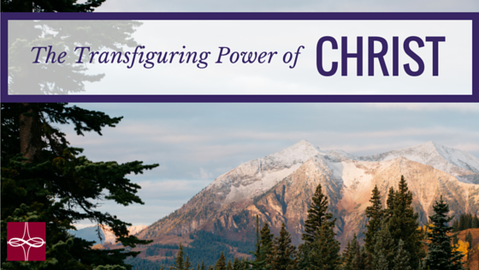
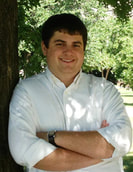

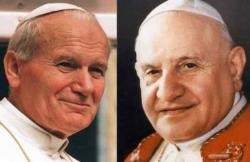
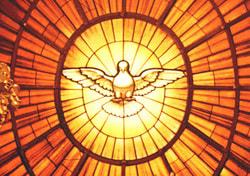
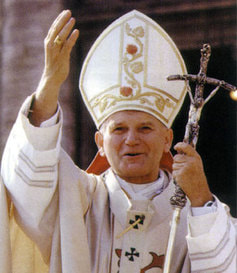
 RSS Feed
RSS Feed